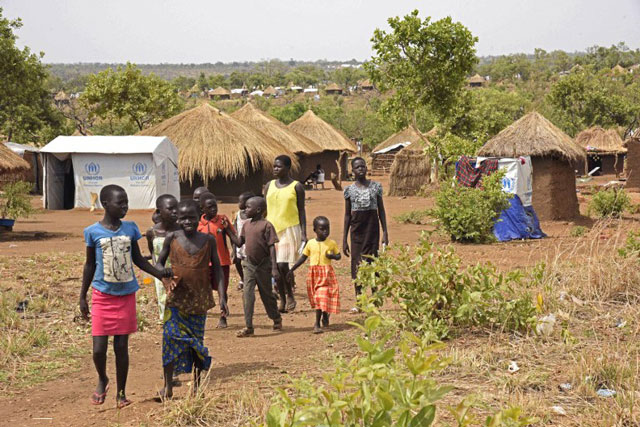
Kayunga, Uganda | THE INDEPENDENT | Several learners in Kyedikyo settlement camp in Galiraya sub county, Kayunga district have abandoned their studies and joined their parents to hunt for food due to severe hunger. The camp is home to more than 800 people from over 250 households displaced by floods resulting from the high water levels in Lake Kyoga.
According to the authorities, about 65 percent of the people in the camp are school-going children. The local leaders say that they last received food relief from the government in September last year.
Kitaka Sserwadda, the chairperson of Kyedikyo settlement camp, says that pregnant women, children, and the elderly are most affected by hunger. He explains that due to severe hunger, no single child has returned to school as they have decided to stay home to assist their parents to look for food.
The nearby schools, which are about five kilometers are Namalere, Kasokwe primary school, and Galiraya Seed school. Teddy Namuyiga, a primary five pupil says that walking from the camp to Namalere on a daily basis is hard since they spend days on empty stomachs.
URN has established that parents in the camp supported the erection of a temporary structure accommodating nursery to primary two classes. However, there is only one teacher who handles all three classes.
Peter Mukasa, who handles the three classes, says that this term alone he managed to register 120 pupils. He however says that he is often forced to send them home before midday because of hunger and lack of sanitary facilities.
“They report but still we do singing only for nursery and primary one to two recitations of numbers, letters, and words I write on the blackboard since they lack books and pencils. None of their parents are able to buy for them,” Mukasa said.
The camp comprises people mainly displaced from Bweyale B, Ntimba, Kawongo landing sites, and Kampatanya and Kyendiko landing sites in Galiraya sub-county where houses and gardens were submerged. They have currently pitched camp on land belonging to Harriet Namaganda.
Besides learners abandoning schools because of hunger, mature people are crying about the same. Joyce Asuka, 70, is among the affected residents. Like the rest of the camp dwellers, Aduka lives in a small mud and wattle hut with five of her grandchildren whose mother and father’s whereabouts are unknown ever since they went missing last year.
“I don’t know what happened to their parents, currently it’s my grandchildren that feed me as well as the community whenever it feels necessary. We sleep on the floor inside our hut. The entire body is in pain but still, I lack the capacity to reach out to any medical facility since they are located in distant areas and I can not ably work.” Aduka said.
Ruth Mbabazi, the village women secretary says since they camped in the area last year, they have been lucky to survive diseases such as malaria, COVID-19, and cholera. She however says that several children and aged people have started suffering from mal-nutrition-related illnesses such as anemia, and kwashiorkor.
Our reporter saw a number of children with extended stomachs and cheeks. Several of the children lay down on verandahs and looked emaciated. Mbabazi says that they would wish to work for food in gardens but still, it requires them to walk between 30-40 kilometers to the neighboring sub-counties to work in banana plantations.
URN also established that the camps are surrounded by new sugarcane plantations and animal grazing grounds. The entire camp lacks a single pit latrine after the landlord stopped the displaced persons from digging latrines or establishing gardens fearing that they may end up establishing permanent residences.
In September last year, Prime Minister Robinah Nabbanja instructed Kayunga district local government to work closely with her office to conduct a valuation of the land housing the camps so that government can pay off the owner.
The LC5 chairperson Andrew Muwonge, says that although there have been delays to purchase the land, plans are still underway. He notes that they are also working closely with the office of the Prime Minister to get food relief.
*****
URN
 The Independent Uganda: You get the Truth we Pay the Price
The Independent Uganda: You get the Truth we Pay the Price



